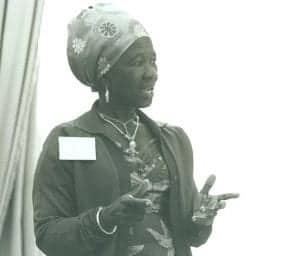Last week, Google Doodle introduced billions of people to an incredible woman: Esther Nkulenu Ocloo, a Ghanaian entrepreneur, advocate for women, pioneer of microfinance and co-founder of Women’s World Banking.
This Doodle sparked a landslide of articles highlighting Esther’s life and work. And while they mention her as our co-founder, how her story is so inextricable from ours remains untold. Not anymore.
Esther was already a self-made businesswoman by the time the invitation to represent Ghana at the first UN World Conference on Women came around in 1975. Prior to leaving for the conference, Esther met with other Ghanaian women market entrepreneurs to brainstorm on the main issue they wanted to convey at the conference. Their response was singular and unequivocal. Above all else, the women identified lack of access to credit for their small businesses as the most important input that they needed to succeed. They believed that once they had credit, they could use the capital to generate enough funds from their businesses to meet all other needs.

But she wasn’t done. Upon returning home, Esther and other leading women entrepreneurs, bankers, lawyers, educators and community organizers in Ghana joined forces and in 1982 incorporated Women’s World Banking Ghana (WWBG), which was among the first of Women’s World Banking’s network members in Africa and the world. Through WWBG and the rest of the members of the network, Esther sought to demonstrate that one could integrate philanthropy and business: bringing positive impact on women’s lives through sustainable institutions.
One cannot underestimate Esther’s contribution to Women’s World Banking, particularly in the early days. She assumed a formal leadership role right at the beginning, was elected to the funding Board of Trustees and became its first chairperson from 1980 to 1985. Because of her leadership, people believed in the organization and in its role in advancing and promoting women entrepreneurship, especially among low-income women. Even after her term as the chair and member of the Board of Trustees, she continued to provide support to Women’s World Banking and its network, motivating and encouraging many network leaders—young and old—to go the extra mile in confronting the obstacles that hinder women from being successful.
 Of course, Esther’s impact extends far beyond Women’s World Banking. She was a true ‘global citizen,’ speaking for women in business the world over, particularly in Africa. She firmly believed that the true emancipation of women would only be achieved if they had access to finance, markets and skills training.
Of course, Esther’s impact extends far beyond Women’s World Banking. She was a true ‘global citizen,’ speaking for women in business the world over, particularly in Africa. She firmly believed that the true emancipation of women would only be achieved if they had access to finance, markets and skills training.
Esther Ocloo demonstrated that you could be from humble beginnings and achieve great things with hard work, honesty, and integrity. To this day, her courage and belief in the power of women to improve and change their lives, families and communities lives on in Women’s World Banking’s global Network of 35 institutions from 24 countries reaching 16 million women with the financial tools and resources they need. Esther Ocloo continues to inspire us today and we’re thrilled Google Doodle shared her legacy with the world.



